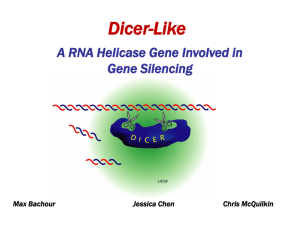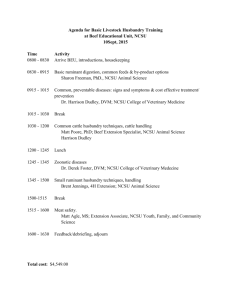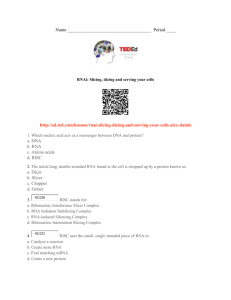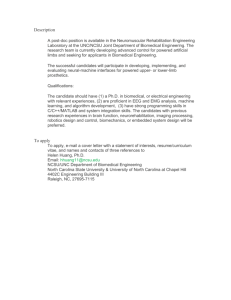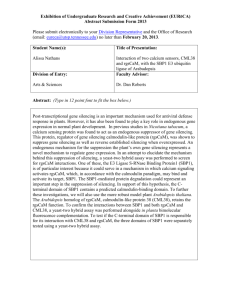BIT595 N and O: RNA interference and model organisms
advertisement
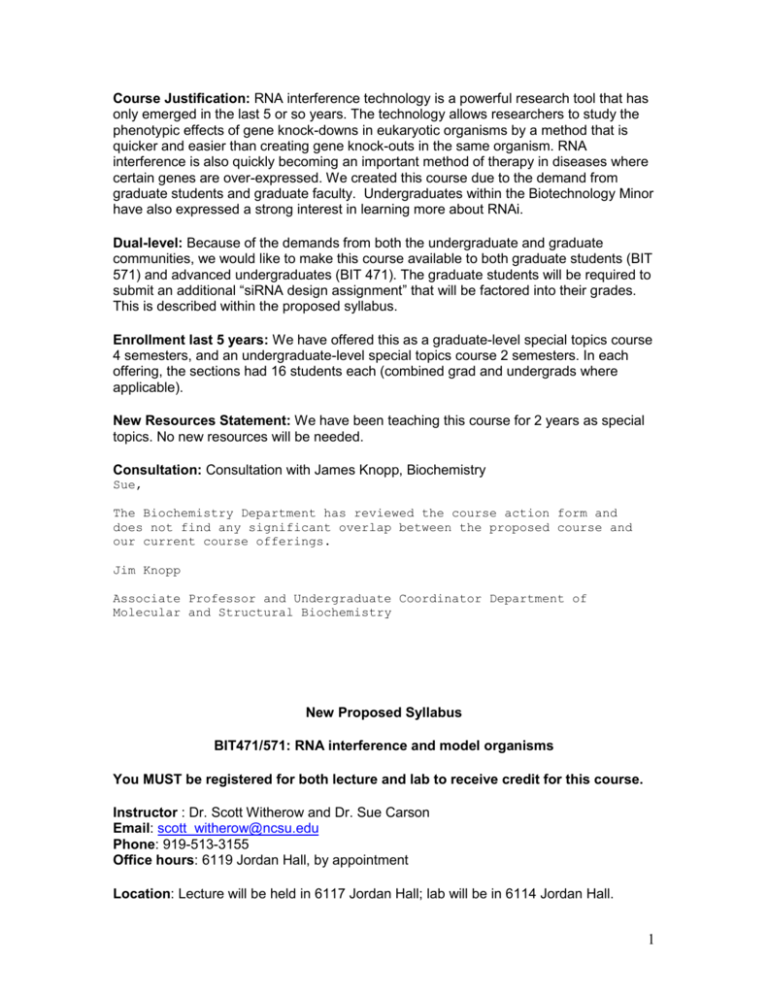
Course Justification: RNA interference technology is a powerful research tool that has only emerged in the last 5 or so years. The technology allows researchers to study the phenotypic effects of gene knock-downs in eukaryotic organisms by a method that is quicker and easier than creating gene knock-outs in the same organism. RNA interference is also quickly becoming an important method of therapy in diseases where certain genes are over-expressed. We created this course due to the demand from graduate students and graduate faculty. Undergraduates within the Biotechnology Minor have also expressed a strong interest in learning more about RNAi. Dual-level: Because of the demands from both the undergraduate and graduate communities, we would like to make this course available to both graduate students (BIT 571) and advanced undergraduates (BIT 471). The graduate students will be required to submit an additional “siRNA design assignment” that will be factored into their grades. This is described within the proposed syllabus. Enrollment last 5 years: We have offered this as a graduate-level special topics course 4 semesters, and an undergraduate-level special topics course 2 semesters. In each offering, the sections had 16 students each (combined grad and undergrads where applicable). New Resources Statement: We have been teaching this course for 2 years as special topics. No new resources will be needed. Consultation: Consultation with James Knopp, Biochemistry Sue, The Biochemistry Department has reviewed the course action form and does not find any significant overlap between the proposed course and our current course offerings. Jim Knopp Associate Professor and Undergraduate Coordinator Department of Molecular and Structural Biochemistry New Proposed Syllabus BIT471/571: RNA interference and model organisms You MUST be registered for both lecture and lab to receive credit for this course. Instructor : Dr. Scott Witherow and Dr. Sue Carson Email: scott_witherow@ncsu.edu Phone: 919-513-3155 Office hours: 6119 Jordan Hall, by appointment Location: Lecture will be held in 6117 Jordan Hall; lab will be in 6114 Jordan Hall. 1 Times: Lecture is on Thursday from 1:30 - 3:20 p.m.; lab is on Tuesday from 12:25 5:25 p.m. Course Structure: This course meets for half a semester, with a 2-hour lab and a 5hour lecture each week. Course Description: Introduction and history of RNA interference technology. Principles, mechanism, and applications of RNA interference in model organisms. Laboratory sessions include RNA interference-mediated silencing of genes in plants, C. elegans, and mammalian cell culture. This is a half-semester course. Student Learning Outcomes: The goal of this course is for students to gain an understanding of different model organisms available for genetic manipulations and how to apply RNA interference (RNAi) technology to silence gene expression, with hands-on manipulations in Nicotiana benthamiana (tobacco plants), in Caenorhabditis elegans (C. elegans) and in mammalian cell culture. Upon completion of the course, students will be able to • Design experiments to silence gene expression in various organisms • Generate and understand experiments to assess extent of silencing • Read and present primary literature papers • Use online tools to design RNA silencing constructs to knockdown mammalian protein expression. • Discuss the advantages and disadvantages of model organisms • Develop practical proficiency using Nicotiana benthamiana tobacco plants, Caenorhabditis elegans, and mammalian cell culture. Prerequisites: BIT 410 OR BIT 510 OR BCH 454 Safety & Risk Assumptions This course has a significant laboratory component. Students will receive safety orientation in the first week of lab and will be expected to follow all safety guidelines. Supplies: A USB flash drive to lab to store data, a calculator, and a bound lab notebook (a composition pad can be used if you number the pages in advance) are required and should be brough to each lab. There is no required textbook, but you will be responsible for downloading, reading and discussing primary literature, posted on Vista. No textbook is required. Grading Grading components for BIT 471: 75% Laboratory reports (three lab reports, each worth 25%) 15% Final exam 5% Lecture participation and laboratory citizenship: punctuality, preparedness (may be assessed with pop quizzes), courtesy, cleanliness and technique 5% Laboratory notebooks Grading components for BIT 571: 2 70% Laboratory reports (three lab reports, each worth ~23%) 15% Final exam 5% siRNA design assignment 5% Lecture participation and laboratory citizenship: punctuality, preparedness (may be assessed with pop quizzes), courtesy, cleanliness and technique 5% Laboratory notebooks Letter Grades This Course uses Standard NCSU Letter Grading Scale 97 ≤ A+ ≤ 100 93 ≤ A < 97 90 ≤ A- < 93 87 ≤ B+ < 90 83 ≤ B < 87 80 ≤ B- < 83 77 ≤ C+ < 80 73 ≤ C < 77 70 ≤ C- < 73 67 ≤ D+ < 70 63 ≤ D < 67 60 ≤ D- < 63 0 ≤ F < 60 Requirements for Credit-Only (S/U) Grading In order to receive a grade of S, students are required to take all exams and quizzes, complete all assignments, and earn a grade of C- or better. Conversion from letter grading to credit only (S/U) grading is subject to university deadlines. Refer to the Registration and Records calendar for deadlines related to grading. For more details refer to http://www.ncsu.edu/policies/academic_affairs/courses_undergrad/REG02.20.15.php. Requirements for Auditors (AU) Information about and requirements for auditing a course can be found at http://www.ncsu.edu/policies/academic_affairs/pols_regs/REG205.00.5.php. Auditors must make an appointment to discuss requirements in the first week of class. Policies on Incomplete Grades If an extended deadline is not authorized by the instructor or department, an unfinished incomplete grade will automatically change to an F after either (a) the end of the next regular semester in which the student is enrolled (not including summer sessions), or (b) the end of 12 months if the student is not enrolled, whichever is shorter. Incompletes that change to F will count as an attempted course on transcripts. The burden of fulfilling an incomplete grade is the responsibility of the student. The university policy on incomplete grades is located at http://www.ncsu.edu/policies/academic_affairs/grades_undergrad/REG02.50.3.php. Attendance Policy: Attendance at ALL laboratories is mandatory. Examples of excused absences are scientific conferences pre-approved by the instructor, religious observance, a death in the family, or serious illness/injury with a doctor's note. Please see the university policy on excused absences: http://www.ncsu.edu/policies/academic_affairs/pols_regs/REG205.00.4.php. One 3 unexcused absence from lab will result in a reduction of one full letter grade (10 points) in the course. Two unexcused absences will result in failure of the course. Lecture attendance is also required and will be strongly reflected in your participation grade. Missing a lecture period during which lab exercises are to be performed will greatly affect your class participation grade (up to 5% of your final grade). If you have more than two excused absences, you will receive an incomplete for the semester and be expected to make up missed work in the following semester. If you have two unexcused "lates to lab" by 30 minutes or more, it will count as an unexcused absence. Website: The class website is on Vista (http://vista.ncsu.edu) listed under BIT595N; use your unity ID and password to log in. Lecture slides will be posted on the site, but may not be posted until immediately prior to lecture. Lab protocols will be posted online before lab day. It is your responsibility to print out and to read the protocol prior to coming to lab. Primary literature articles have been uploaded to the site. Lab protocols: All lab protocols must be read BEFORE coming to lab, and must be brought to the laboratory. Lab notebooks: Prior to coming to lab, you are encouraged to write the purpose of the lab in your notebook. Each lab must be dated and must include a purpose, a reference to the protocol, annotation of any deviations to the protocol given by the instructor or taken by you, all results and conclusions. You must complete your notebook entry before leaving the lab. Your lab notebook will be graded at the end of the course. Lab reports: Lab reports must be typed. All lab reports should contain each of the following sections: title, introduction, purpose, materials and methods, results, and discussion. The reports should demonstrate an understanding of the gene silencing technique and controls used for that particular organism. All lab reports are due on time at the beginning of the period; one letter grade (10 points) will be dropped for a late lab report. No reports will be accepted after they are one week late. You may discuss results with your classmates, but reports are to be written independently. Further information on lab report guidelines can be found on Vista. siRNA design assignment (for BIT 571 students only):You will be given sequences of siRNAs that could target a given molecule. Using the information discussed in class (as well as useful web resources discussed in class), you will choose which siRNA you expect to work best and defend your answer. Academic Integrity Students are required to comply with the univeristy policy on academic integrity found in the Code of Student Conduct found at http://www.ncsu.edu/policies/student_services/student_discipline/POL11.35.1.php. Academic Honesty See http://www.ncsu.edu/policies/student_services/student_discipline/POL11.35.1.php for a detailed explanation of academic honesty. Honor Pledge Your signature on any test or assignment indicates "I have neither given nor received unauthorized aid on this test or assignment." Accommodations for Disabilities 4 Reasonable accommodations will be made for students with verifiable disabilities. In order to take advantage of available accommodations, student must register with the Disability Services Office (http://www.ncsu.edu/dso) located at 1900 Student Health Center, Campus Box 7509, 515-7653. For more information on NC State's policy on working with students with disabilities, please see the Academic Accommodations for Students with Disabilities Regulation at http://www.ncsu.edu/policies/academic_affairs/courses_undergrad/REG02.20.1.php. Policy on Discrimination NC State University provides equality of opportunity in education and employment for all students and employees. Accordingly, NC State affirms its commitment to maintain a work environment for all employees and an academic environment for all students that is free from all forms of discrimination. Discrimination based on race, color, religion, creed, sex, national origin, age, disability, veteran status, or sexual orientation is a violation of state and federal law and/or NC State University policy and will not be tolerated. Harassment of any person (either in the form of quid pro quo or creation of a hostile environment) based on race, color, religion, creed, sex, national origin, age, disability, veteran status, or sexual orientation also is a violation of state and federal law and/or NC State University policy and will not be tolerated. Retaliation against any person who complains about discrimination is also prohibited. NC State's policies and regulations covering discrimination, harassment, and retaliation may be accessed at http://www.ncsu.edu/policies/campus_environ or http://www.ncsu.edu/equal_op. Any person who feels that he or she has been the subject of prohibited discrimination, harassment, or retaliation should contact the Office for Equal Opportunity (OEO) at 5153148. Class Evaluations: Online class evaluations will be available for you to complete during the last two weeks of class (November 21 - December 8). Students will receive an email message directing them to a website where they can login using their Unity ID and complete evaluations. All evaluations are confidential; instructors will never know how any one student responded to any question, and students will never know the ratings for any particular instructors. Evaluation website: https://classeval.ncsu.edu Student help desk: classeval@ncsu.edu More information about ClassEval: http://www2.acs.ncsu.edu/UPA/classeval/ Schedule: This schedule is a general guideline. Lecture topic dates may be adjusted due to timing issues. Assignment due dates are included; you are responsible for keeping track of the deadlines. 10/16 Week 1 Lecture Syllabus, WebCT Vista, lab notebook, grading policy. Introduction to RNA interference (RNAi): Brief History, Endogenous Roles, Molecular Mechanism, Applications, and Methods for Detecting Silencing. 5 10/21 Week 2 Lab Station check in and safety instructions. Seedling Transplantation, and Maxiprep Preparation of DNA-Directed Silencing Constructs(cultures started day before by instructor). Agarose gel electrophoresis and spectrophotometric quantification using Nanodrop. 10/23 Lecture Genetics and Post Transcriptional Gene Silencing in Plants. 10/28 Lab Virus Induced Gene Silencing of Magnesium Chelatase (Su), a Chlorophyll Biosynthesis Enzyme, in Nicotiana benthamiana Tobacco Plants Using Microprojectile Delivery. 10/30 Lecture C. elegans: Model Organism and RNAi Experiments. Lab Phenotypic Assessment of Su Gene Silencing in Plants, and Initiation of C.elegans Silencing Experiment to Knockdown Transgenic Green Fluorescent Protein (GFP) Expression. Week 3 11/4 Week 4 11/6 Lecture Genetic manipulations and RNAi in Drosophila. 11/11 Lab Assessment of Gene Silencing in Plants (Phenotypic Evaluation, RNA Isolation and Preparation of Real Time RT-PCR Reactions) and in C.elegans (Fluorescence Evaluation). Discussion of C. elegans lab report expectations. 11/13 Lecture RNAi and Mammalian Systems. Lab Lab report 1 due: RNA interference in C. elegans Evaluation of Su Gene Silencing in Tobacco Plants (Phenotypic Assessment and Analysis of Real Time RT-PCR), and Initiation of Mammalian Cell Culture Silencing Experiment using Transient Transfection to Deliver Short Hairpin RNA Expression Plasmids to Silence Enhanced GFP (EGFP) Transgene. Demonstration: cell culture technique. Week 5 11/18 Week 6 11/20 Lecture MicroRNAs and other RNA targeting molecules 6 11/25 Lab Lab report 2 due: Viral Induced Gene Silencing (VIGS) in tobacco plants Assessment of Fluorescence of Silenced Mammalian Cells Visually and Using a Microplate Reader, and Initiation of Immunoblot to Determine EGFP Protein Levels. 11/27 Lecture No lecture: Happy Thanksgiving! 12/2 Lab Completion of Western Blot and Analysis of the Effect of Gene Silencing on EGFP Protein Levels in Mammalian Cell Culture. Lab report 3 (RNAi in mammalian cells) due. Week 7 Week 8 12/4 12/11 Lecture Therapeutic uses of RNAi: Applications, Limitations, Clinical Trials. Other RNA targeting molecules: antisense RNA, and external guide sequence techniques. Lab report 3 due: RNA interference in mammalian cells Final exam, Thursday, Dec. 11 from 1 - 3 p.m. in Jordan classroom *If you have a schedule conflict (or multiple exams in a row), let me know in advance and I wil try to determine a different time for you to take the exam. Old Syllabus (as Special Topics) BIT595 N and O: RNA interference and model organisms You MUST be registered for both lecture (595N) and lab (595O) to receive credit for this course. Instructor : Dr. Scott Witherow and Dr. Sue Carson Email: scott_witherow@ncsu.edu Phone: 919-513-7685 Office hours: 6119 Jordan Hall, by appointment Location: Lecture will be held in 6117 Jordan Hall; lab will be in 6114 Jordan Hall. Times: Lecture is on Thursday from 1:30 - 3:20 p.m.; lab is on Tuesday from 12:25 5:25 p.m. Website: The class website is on Vista (http://vista.ncsu.edu) listed under BIT595N; use your unity ID and password to log in. Lecture slides will be posted on the site, but may not be posted until immediately prior to lecture. Lab protocols will be posted online before lab day. It is your responsibility to print out and to read the protocol prior to coming to lab. Primary literature articles have been uploaded to the site. 7 Supplies: A USB flash drive to lab to store data, a calculator, and a bound lab notebook (a composition pad can be used if you number the pages in advance) are required and should be brough to each lab. There is no required textbook, but you will be responsible for downloading, reading and discussing primary literature, posted on Vista. Course Objectives: The goal of this course is for students to gain an understanding of different model organisms available for genetic manipulations and how to apply RNA interference (RNAi) technology to silence gene expression, with hands-on manipulations in Nicotiana benthamiana (tobacco plants), in Caenorhabditis elegans (C. elegans) and in mammalian cell culture. Upon completion of the course, students will be able to: 1. Comprehend the advantages and disadvantages of various model organisms, 2. Understand the principles and applications of RNAi, 3. Develop practical proficiency using RNAi in Nicotiana benthamiana, C. elegans and a mammalian tissue culture cell line, HEK293 cells, and 4. Design experiments to silence gene expression in numerous organisms, including appropriate controls, and to assess extent of silencing. Grading: 75% Laboratory reports (three lab reports, each worth 25%) 15% Final exam 5% Lecture participation and laboratory citizenship: punctuality, preparedness (may be assessed with pop quizzes), courtesy, cleanliness and technique 5% Laboratory notebooks Numerical grade cut-offs are as follows: A+ = 98%, A = 92%, A- = 90%, B+ = 88%, B = 82%, B- = 80%, C+ = 78%, C = 72%, C- = 70%, D+ = 68%, D = 62%, D- = 60%, F = below 60%. A grade of Incomplete (IN) will be given only if there is an excused significant and verifiable disruption in the student's work. Students auditing the class are excused from the final exam, but must attend lecture, lab and complete all other assignments. A grade of 70 or better is required to pass (for credit only students). Attendance Policy: Attendance at ALL laboratories is mandatory. Examples of excused absences are scientific conferences pre-approved by the instructor, religious observance, a death in the family, or serious illness/injury with a doctor's note. Please see the university policy on excused absences: http://www.ncsu.edu/policies/academic_affairs/pols_regs/REG205.00.4.php. One unexcused absence from lab will result in a reduction of one full letter grade (10 points) in the course. Two unexcused absences will result in failure of the course. Lecture attendance is also required and will be strongly reflected in your participation grade. Missing a lecture period during which lab exercises are to be performed will greatly affect your class participation grade (up to 5% of your final grade). If you have more than two excused absences, you will receive an incomplete for the semester and be 8 expected to make up missed work in the following semester. If you have two unexcused "lates to lab" by 30 minutes or more, it will count as an unexcused absence. Lab protocols: All lab protocols must be read BEFORE coming to lab, and must be brought to the laboratory. Lab notebooks: Prior to coming to lab, you are encouraged to write the purpose of the lab in your notebook. Each lab must be dated and must include a purpose, a reference to the protocol, annotation of any deviations to the protocol given by the instructor or taken by you, all results and conclusions. You must complete your notebook entry before leaving the lab. Your lab notebook will be graded at the end of the course. Lab reports: Lab reports must be typed. All lab reports should contain each of the following sections: title, introduction, purpose, materials and methods, results, and discussion. The reports should demonstrate an understanding of the gene silencing technique and controls used for that particular organism. All lab reports are due on time at the beginning of the period; one letter grade (10 points) will be dropped for a late lab report. No reports will be accepted after they are one week late. You may discuss results with your classmates, but reports are to be written independently. Further information on lab report guidelines can be found on Vista. Academic Integrity: Guidelines set forth in the NCSU Policy on Academic Integrity will be strictly followed. These can be viewed at http://www.ncsu.edu/policies/student_services/student_discipline/POL11.35.1.php. In particular, sections 7 - 12 should be reviewed if there is any doubt as to what constitutes plagiarism or cheating. It should also be noted that helping others is a violation if independent work is requested. You will be working with a partner for each of the laboratory exercises. It is expected that you will work together, or in groups, for data analysis and presentation. However, each lab report must contain original data from your experiments and the written part must be in your own words and represent your understanding of the conclusions to be drawn from the experiment. You also must not copy directly from the lab manual. Any evidence of plagiarism will be dealt with according to section 13. If you miss a lab due to an excused absence, you should submit a lab report using another group's original data; the other group must be clearly acknowledged in the laboratory report. The following section of the policy is repeated here as a reminder of academic integrity: "8.2 A student shall be guilty of a violation of academic integrity if he or she: - represents the work of others as his or her own; - obtains assistance in any academic work from another individual in a situation in which the student is expected to perform independently; - gives assistance to another individual in a situation in which that individual is expected to perform independently; - offers false data in support of laboratory or field work." 9 Students with Disabilities: Reasonable accommodations will be made for students with verifiable disabilities. In order to take advantage of available accommodations, students must register with Disability Services for Students at 1900 Student Health Center, Campus Box 7509, 515-7653. http://www.ncsu.edu/provost/offices/affirm_action/dss/ For more information on NC State's policy on working with students with disabilities, please see the Academic Accommodations for Students with Disabilities Regulation (http://www.ncsu.edu/policies/academic_affairs/courses_undergrad/REG02.20.1.php). Behavior: Code of Student Conduct is addressed at: http://www.ncsu.edu/policies/student_services/student_discipline/POL11.35.1.php. Harassment of any kind will not be tolerated and includes behavior that is directed toward a particular person (or persons), is unwelcome and severe or pervasive, and violates criminal law, civil rights law, the NCSU Administrative Regulation on harassment, or that unreasonably interferes with the target person's employment, academic pursuits, or participation in University-sponsored activities. Additional information can be found at: http://www.ncsu.edu/provost/offices/affirm_action/policies.html. Class Evaluations: Online class evaluations will be available for you to complete during the last two weeks of class (November 21 - December 8). Students will receive an email message directing them to a website where they can login using their Unity ID and complete evaluations. All evaluations are confidential; instructors will never know how any one student responded to any question, and students will never know the ratings for any particular instructors. Evaluation website: https://classeval.ncsu.edu Student help desk: classeval@ncsu.edu More information about ClassEval: http://www2.acs.ncsu.edu/UPA/classeval/ Schedule: This schedule is a general guideline. Lecture topic dates may be adjusted due to timing issues. Assignment due dates are included; you are responsible for keeping track of the deadlines. 10/16 Week 1 Lecture Syllabus, WebCT Vista, lab notebook, grading policy. Introduction to RNA interference (RNAi): Brief History, Endogenous Roles, Molecular Mechanism, Applications, and Methods for Detecting Silencing. 10 10/21 Lab Station check in and safety instructions. Seedling Transplantation, and Maxiprep Preparation of DNA-Directed Silencing Constructs(cultures started day before by instructor). Agarose gel electrophoresis and spectrophotometric quantification using Nanodrop. 10/23 Lecture Genetics and Post Transcriptional Gene Silencing in Plants. 10/28 Lab Virus Induced Gene Silencing of Magnesium Chelatase (Su), a Chlorophyll Biosynthesis Enzyme, in Nicotiana benthamiana Tobacco Plants Using Microprojectile Delivery. 10/30 Lecture C. elegans: Model Organism and RNAi Experiments. Lab Phenotypic Assessment of Su Gene Silencing in Plants, and Initiation of C.elegans Silencing Experiment to Knockdown Transgenic Green Fluorescent Protein (GFP) Expression. Week 2 Week 3 11/4 Week 4 11/6 Lecture Genetic manipulations and RNAi in Drosophila. 11/11 Lab Assessment of Gene Silencing in Plants (Phenotypic Evaluation, RNA Isolation and Preparation of Real Time RT-PCR Reactions) and in C.elegans (Fluorescence Evaluation). Discussion of C. elegans lab report expectations. 11/13 Lecture RNAi and Mammalian Systems. Lab Lab report 1 due: RNA interference in C. elegans Evaluation of Su Gene Silencing in Tobacco Plants (Phenotypic Assessment and Analysis of Real Time RT-PCR), and Initiation of Mammalian Cell Culture Silencing Experiment using Transient Transfection to Deliver Short Hairpin RNA Expression Plasmids to Silence Enhanced GFP (EGFP) Transgene. Demonstration: cell culture technique. Week 5 11/18 Week 6 11/20 Lecture MicroRNAs and other RNA targeting molecules 11 11/25 Lab Lab report 2 due: Viral Induced Gene Silencing (VIGS) in tobacco plants Assessment of Fluorescence of Silenced Mammalian Cells Visually and Using a Microplate Reader, and Initiation of Immunoblot to Determine EGFP Protein Levels. 11/27 Lecture No lecture: Happy Thanksgiving! 12/2 Lab Completion of Western Blot and Analysis of the Effect of Gene Silencing on EGFP Protein Levels in Mammalian Cell Culture. Lab report 3 (RNAi in mammalian cells) due. 12/4 Lecture Therapeutic uses of RNAi: Applications, Limitations, Clinical Trials. Other RNA targeting molecules: antisense RNA, and external guide sequence techniques. Lab report 3 due: RNA interference in mammalian cells 12/11 Final exam, Thursday, Dec. 11 from 1 - 3 p.m. in Jordan classroom *If you have a schedule conflict (or multiple exams in a row), let me know in advance and I wil try to determine a different time for you to take the exam. Week 7 Week 8 12

